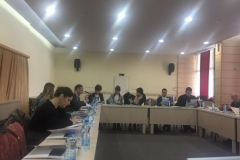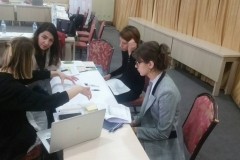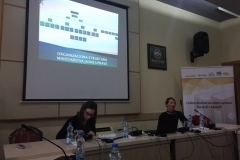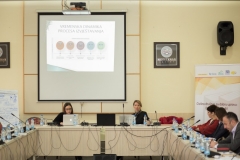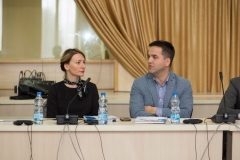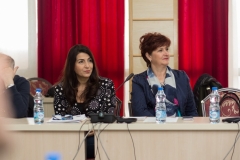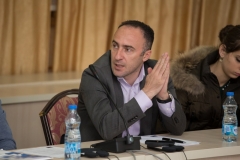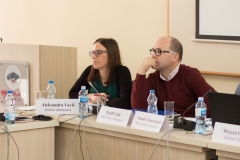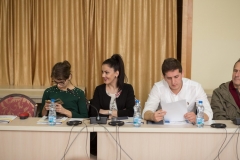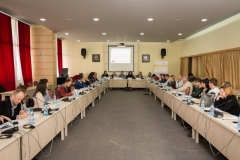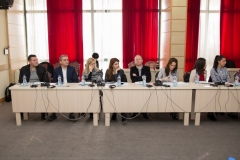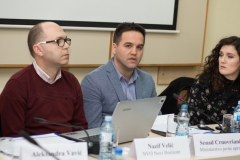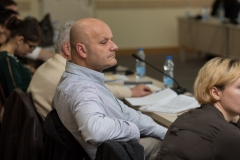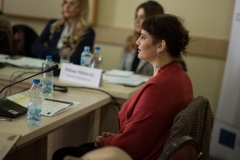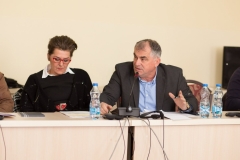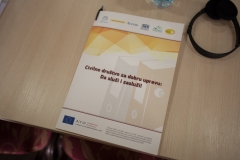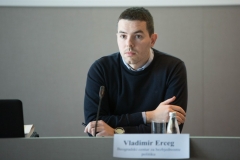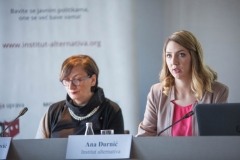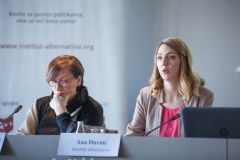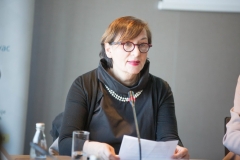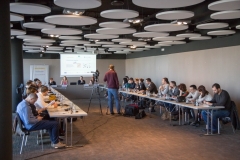DPS continues with an offensive against independency of RTCG
Today’s dismissal of PhD Vladimir Pavicevic and election of Ivan Jovetic for new president of the Council of RTCG, represents a continuation of political offensive of Democratic Party of Socialists (DPS) against independency of public broadcaster RTCG.
At the new session with participation of new members of the Council of RTCG, Ivan Jovetic and Goran Sekulovic, a party mission was implemented and a former member of Commission of DPS for international cooperation, European and Euro-Atlantic integration was brought to the head of the public service. By this, a second phase of overtaking of RTCG was done, which has started by dismissal of unsuitable members of the Council Nikola Vukcevic and Goran Djurovic, and by bringing party associates Pajovic, Jovetic and Sekulovic.
DPS is firm in the intention to bring even this institution which has started to show signs of autonomy back under its control. Not even the well-intentioned calls of governments of countries partners of Montenegro, multiple times stated via public and diplomatic channels, have not borne fruit, and DPS has, as we have announced, decided to realise its notion until the end.
We express concern that the process of overtaking of RTCG will be brought to the end by dismissal of the Director General Andrijana Kadija and Director of Television Vladan Micunovic.
Instead of expanding media freedom and strengthening independency of public service, the Montenegrin authorities are clearly showing by this that they do not wish to democratise the society, and that there is no doubt that they wish to slow down the accession negotiation process.
Ana Novakovic, Executive Director, Center for Development of Non-Governmental Organisations (CDNGO)
Daliborka Uljarevic, Executive Director, Centre for Civic Education (CCE)
Stevo Muk, President of the MB, Institute Alternative (IA)
Zlatko Vujovic, President of the MB, Center for Monitoring and Research (CEMI)
Conference:“Public Administration Reform: For Quality Services at the Local Level“
Enlargement Strategy: Credibility of the New Approach Depends on Implementation
The European Commission’s document on the credible enlargement perspective for the Western Balkans offers least novelties in the area of the rule of law, assessed Milena Milosevic at a conference organized in Belgrade.
The Conference on the European Union and the Western Balkans was held in Belgrade in organization of the Directorate General for Neighborhood and Enlargement Negotiations of the European Commission, the European Policy Center from Serbia and TEN Network whose member is Institute Alternative.

Certain elements of this document, which will officially become the new enlargement strategy after all EU member states confirm it, are not new and it is hard to say in advance how bad or good they are, said Milena Milošević.
She noted that everyone considers the new Enlargement Strategy to be a kind of a “wish list” where everyone’s priorities are to be found. However, it is much more important what will happen on the basis of initiatives proposed by the document.
Milena recalled that the European Commission had previously used special expert missions as well, which are proposed in the document as one of the elements for strengthening the rule of law.
“The role of these missions, however, was problematic. On one hand, they are good for providing evidence of progress on the ground and providing advice about further developments of certain policies to national governments and the European Commission. On the other hand, however, domestic actors often manipulate the findings of these missions to justify certain decisions even though the wider public is not familiar with the opinions of the experts commissioned by the EU, “Milena said.
She added that due to this, Institute Alternative advocated that the reports of expert missions, commissioned by the European Commission, be made public.
It is equally important that implementation of new conditions and mechanisms in the framework of enlargement to the Western Balkans is more transparent than it has been so far.
Ownership of the reforms that stem from the EU conditions and the new enlargement approach is one of the key challenges.
“If it is written in the document that everyone in the region suffers from elements of captured state, and at the same time it seeks reforms ownership from the same persons who are responsible for the state capture, I have no idea how this ownership can be achieved,” she stressed.
We recall, on 6th February this year, the European Commission presented “A credible enlargement perspective for and enhanced EU engagement with the Western Balkans”. The document presents six flagship initiatives for the improvement of the region, related to strengthening the rule of law, good neighborly relations, security and migration, socio-economic development, digitization and strengthening infrastructure and connectivity.
In the area of rule of law, it envisages adoption of detailed action plans for overcoming current difficulties in implementing reforms. Measures are also expected for improving expert missions and measuring judicial reform, introduction of monitoring over important court processes, and establishment of special endowment for democracy with the aim of improving media freedoms.
IA’s team
Confidential Procurement: Out of Sight – Out of Mind
Panel discussion was organised within the project “Confidential Procurement: Out of Sight – Out of Mind”, implemented by Institute Alternative in cooperation with the media partner Centre for Investigative Journalism with the financial support of the European Union within the regional project “Accountability, Technology and Institutional Openness Network in the South East Europe region – ACTION SEE”.
Uncontrolled Recruitment Continued in Municipalities: Not Enough Chair for Party Cadre
In the Rožaje Municipality, 189 people were hired, although they ought not to recruit new employees due to the unpaid taxes, while their salaries are half a year late. Tivat is a wealthy municipality, but it might not be for long, as due to excessive employment salary expenses have increased about 1.3 million euros. No one can contain the parties, for the time being.
Despite the Government’s commitment to reduce the public sector, the number of employees in local self-governments, public companies and institutions increased for 400 in only three years, whereby new positions cost citizens millions.
According to the Institute Alternative (IA) findings, in the period from 2014 to 2017, the number of employees increased in 11 municipalities in Montenegro, with the highest number in the municipalities of Rožaje and Kotor, followed by Tivat and Podgorica.
The most extreme example is the municipality of Rožaje, which despite signing a tax debt rescheduling agreement, has employed 189 people in the period 2014-2017.
Collocutors of the Center for Investigative Journalism in Montenegro (CIJ-MNE) believe that not only Rožaje self-government should be held accountable for this, but also the Government that tolerated the excessive employment.
However, the competent Ministry of Finance has not responded to CIJ-MNE, whether and in what way they follow realization of obligations of Rožaje and other 15 municipalities that signed a tax debt rescheduling agreement. One of the obligations is also to seek approval from the Ministry for every new employee. The Rožaje Municipality has not explained either why the number of employees increased from 235 to 424 in three years, even after 20 days. The town at the base of Hajla Mountain has been governed by the Bosniak Party (BS) since 2014, and next local elections will take place in two months.
President of the Municipal Board of the Justice and Reconciliation Party in Rožaje, Sadik Klimenta, in a conversation with CIJ-MNE points out that salary of all employees in the local self-government is six months late. He highlights that the Municipality has been “officially bankrupt” since 2014 when it signed a tax debt rescheduling agreement with the Government:
“If you ask me if these 189 people should have got the job, the answer is yes. But not in the way they got it, and not in the local government and local public companies.”
According to Klimenta’s calculation, in three years Rožaje spent 3.9 million euros on the new employees. A position in the local government costs municipality around seven thousand euros per year. For the period 2014-2017 this amounts to 21.000 euros per person,” he said.
Klimenta says it would have been better if the local authorities had organized a seminar on how these persons could make a business plan and then invited them and gave them 20,000 euros each.
“Today we would have 150 new employers and at least 500 new jobs. Everyone would be better off. With the current solution, no one receives a salary, surplus and non-surplus employees alike. And the Municipality is struggling, people are moving away,” Klimenta said.
He places responsibility for this situation with the signatories of the tax debt rescheduling agreement, but he primarily holds the Government to blame, because it lets important issues to be solved by others who have no control function like the one the executive has over local self-governments.
When asked whether this behavior, despite the signed rescheduling agreement for 1.3 milions of tax debt, can be linked to political employment, Klimenta replied:
“Situation is similar in other municipalities. In some DPS is in power, in others BS or DF, SDP, SD. The practice is same, and detrimental for all citizens. In this combination no one wins and everyone loses – some sooner, some later.”
The Tivat municipality is one of the richest, it is not on the list of tax debtors, but if it continues this way, who knows where it will end, as its expenses have been increased with salaries of 160 new employees. Opposition councilor from Action for Tivat, Miomir Abović, argues that this is entirely a matter of political employment and warns that such practice has a disastrous impact on the municipality.
He says a significant increase in the number of employees in the local self-government has started at the end of 2015, and has drastically increased after the local elections of April 2016.
“It is entirely a matter of political employment. And when we look at the educational structure of the new employees and absurd systematizations of municipal services, the whole problem looks even worse. For example, a new employee in one secretariat has a degree of lathe operator, another in the municipal police is a cook …The extent of employment of totally unneeded persons is illustrated by the situation where one of the secretaries, during public discussion on the 2018 budget complained that there is not enough chairs in the municipality for all employees, “says Abović.
The Tivat budget for 2015 provided 1.870.200 euros for salaries and contributions, while this year amount is 3.105.220 euros. Abović emphasizes that, in the meantime, the Law on Public Sector Salaries significantly reduced coefficients and that it is clear that “party employment” has a disastrous impact on the finances of the municipality.
According to the IA information, based on the official data of the Government, nine municipalities reduced the number of employees in the period 2014-2017.
The best result was achieved by two Northern Municipalities – Kolašin reduced the number of employees from 224 to 125, and Žabljak from 116 to 61.
However, the municipality of Žabljak explained CIJ-MNE that the number of employees remained almost at the same level as in 2014 and that 54 persons are currently employed in the municipality. The reduction occurred in public companies and institutions – Water Supply, Žabljak Tourist Organization and the Culture Center.
Ministry of Finance turns the blind eye to employment
President of the Managing Board of IA, Stevo Muk, believes that oversight system for tax debt rescheduling signed between the state and municipalities is ineffective and nontransparent.
He says that during the first five months of 2016, 155 positions were published in local self-governments without a consent of the Ministry of Finance, although this is prescribed as an obligation.
Muk further claims that IA was unable to obtain from the Ministry of Finance, on the basis of the request for free access to information, information on the fulfillment of contractual obligations because, as explained to them, this is declared as a tax secret.
“With this kind of interpretation, municipalities, which are primarily citizens’ service, are put into equal position as private companies, and the public remains deprived of data which is of great importance for assessing their efficiency. Last comprehensive information on the extent to which municipalities comply with the obligations stemming from the agreement was made during the term of the Government of Electoral Trust in July 2016, and it was already then clear that the municipalities were not fulfilling obligations in the part of rationalization,” Muk said.
He also believes that public sector employment is one of the important political resources and mechanisms for buying votes:
“Politicians know they will not be subjected to any sanction, nor will their managers be held accountable for breach of agreement obligations.” Muk emphasizes that elections always pose the biggest challenge for politicians to reach for new recruitment, but that systemic problems are pertinent beyond pre-election period.
“Legal gaps in the area of clerical relations are one of the root causes of irrational employment in municipalities, as well as of employment that is not based on merit, and which, in turn, leaves room for other factors, such as kinship and political affiliation, to be crucial. In our monitoring report on public administration reform, we have pointed out that, for example, in some cases, testing procedures for candidates in the Capital City have not been implemented at all and in Pljevlja a job announcement was published for a position already filled” concludes Muk.
The Government Again Drafting Plans
Since 2013, the Government has not managed to establish the optimal number of public sector employees. The Ministry of Public Administration, which was formed only in 2016, informed CIJ-MNE that adoption of the Optimization Plan is expected by the end of the second quarter of this year.
Muk points out that the previous rationalization plan from 2013 was a failure because relevant actors were not honest and the Government gave it up after two years. Increase in the number of employees is noticeable at the central level as well, and there will also be surplus employees.
 Almost all ministries in the Government have slightly increased the number of employees last year. According to personnel plans for the last year, each ministry has systematization according to which it lacks personnel. In the ministries there are about 2.800 employees, in bodies within the ministries and administration of the judiciary and prosecutors’ offices 11.000, in independent bodies 1.600 and some 28.000 in public institutions.
Almost all ministries in the Government have slightly increased the number of employees last year. According to personnel plans for the last year, each ministry has systematization according to which it lacks personnel. In the ministries there are about 2.800 employees, in bodies within the ministries and administration of the judiciary and prosecutors’ offices 11.000, in independent bodies 1.600 and some 28.000 in public institutions.
Montenegro is among the countries with the largest public sector, which allegedly counts more than 51.000 employees, as presented in the IA publication Organisational Chart of the Chaos.
“If we take into account that the total number of employed persons in 2015 was 175.617, this means that the public sector’s share of total employment in Montenegro is at least 29 percent, which is about 10 percent higher than the average in the countries of the Organization for Economic Co-operation and Development (OECD),” as noted in the publication.
By the size of public sector, the Scandinavian countries are at forefront with the share of the public sector in total employment being up to 30 percent, which is the case with Norway, while smaller members of the European Union are around or slightly above the OECD average.
In Slovenia, the share is 17.3 percent, Slovakia 19.3, Estonia 23 percent, which is considerably lower than in Montenegro. The IA document also states that the last annual report of the State Audit Institution showed that expenditure on salaries in public sector in 2016 amounted to 430 million.
Muk believes that the Government still has no clear idea on how to achieve the goals it set and promised to the EU.
“I do not believe there is a strong political will. Even if it were present in the Ministry of Public Administration, my impression is that it is not shared by the others in the administration. This is especially the case in police, independent agencies and municipalities, especially public companies, “concludes Muk.
Public companies in a Fog, Opposing Standpoints of the Government and NGOs
The CIJ-MNE was informed by the Ministry of Public Administration that aggregate data on the number of employees at the central and local level presents the starting point for the process of optimizing the number of public sector employees. Direct budget support for reforms from the EU funds in this area depends on the success of the optimization process.
Interestingly, public companies, such as Airports or National Parks, were not included in the calculation at the central level, unlike the local level.
The Ministry replied that the reason for this was that these companies do not perform administrative tasks, which was one of the main classification criteria.
“These are business entities where privatization trend is increasingly present, in which case they would automatically exit the scope of public sector and would not be relevant for monitoring the optimization process. In this way we would not have an objective picture of the reduction in the number of employees, as the employees in these entities would cease to be employed in the public sector”, as stated by the Ministry.
They claim that a different approach was taken with regard to local level, bearing in mind that at the municipal level a significant number of employees are employed in public companies, which mostly perform traditional tasks of delivering public services to citizens, such as water supply and utilities.
Muk, however, says this is a matter of double standards and that such approach is not comprehensive and logical. He adds that, according to European standards, the number of employees in the public sector includes those employed in so-called non-commercial companies as well.
“When it comes to Montenegro, the figures on employment should at least include those public companies on the central level that are required to comply with the Law on Public Procurement,” he says.
Muk considers it worrying that the Armed Forces are also exempt, although it was included in the previous reorganization plan, as well as the Central Bank, but the largest number of agencies did not provide employment data, indicating that they are not willing to participate in the process.
That is why Muk believes that the failed Plan for Internal Reorganization from five years ago was more advanced because it encompassed the entire public sector.
Author: Ana Komatina
The article was produced as part of the project “Civil society for Good Governance: To Act and Account!”, implemented by Institute Alternative, Bonum, Natura, New Horizon and Centre for Investigative Journalism, and financed by the European Union within the Civil Society Facility, and the Balkan Trust for Democracy project, the German Marshall Fund USA (GMF) project. The contents of the article are the sole responsibility of the author and can in no way be taken to reflect the views of the donors.


